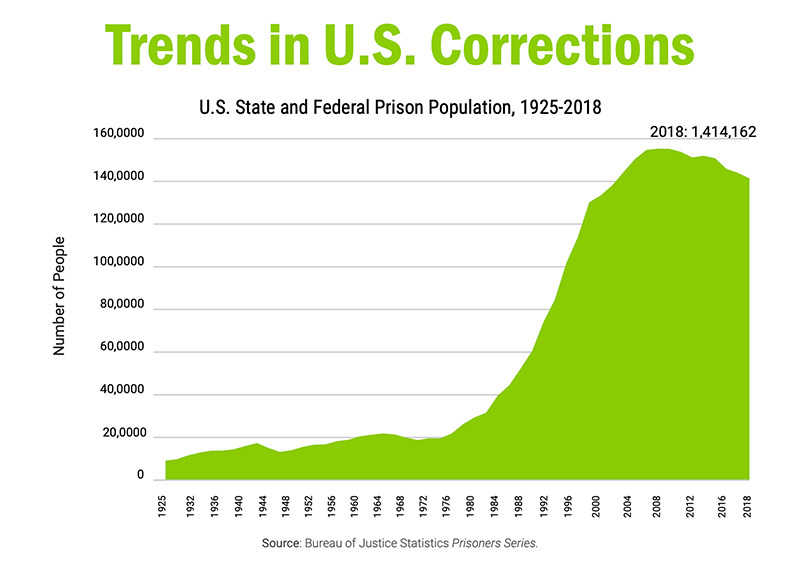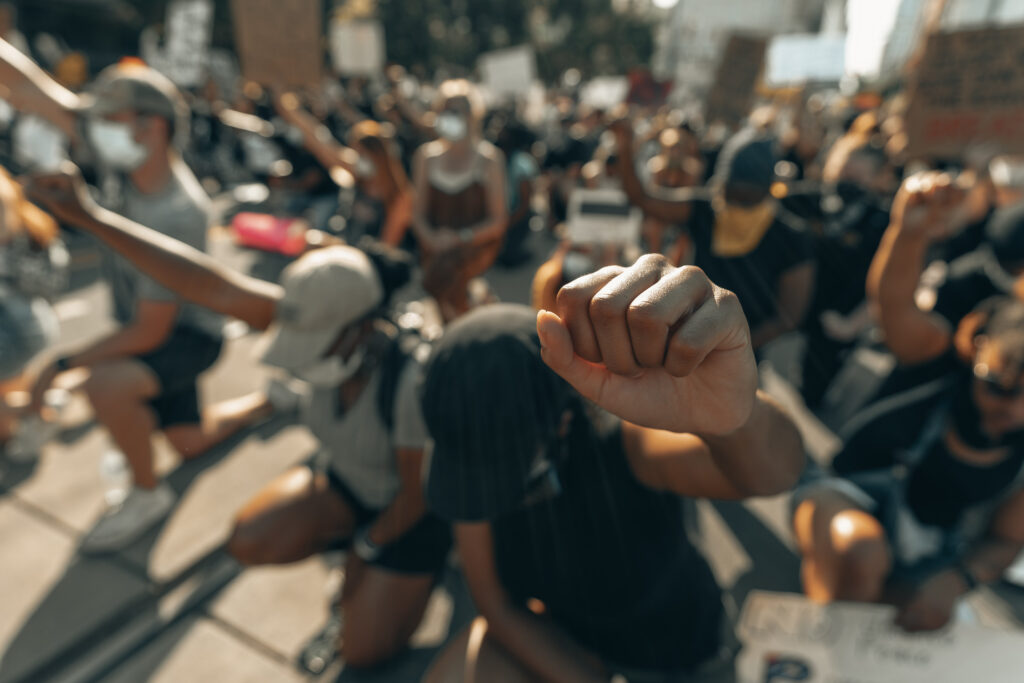Volcanoes are erupting in The Philippines, but on-fire Australia received some welcome rain. The Iran war cries have been called off and The Donald’s military powers are about to be hamstrung by the Senate. Meanwhile, his impeachment trial is starting, and we’re all on Twitter for a front-row seat.
What Could Go Right? Prisons, pardons, and pot
We are doing a little better when it comes to criminal justice reform
This is our weekly newsletter, What Could Go Right? Sign up here to receive it in your inbox every Thursday at 6am ET. You can read past issues here.
Prisons, pardons, and pot
The United States has the second-highest prison population in the world, with 1,675,400 people in prison as of 2021. We sit just under China’s 1,690,000, a country with over four times our total population. How we got into this situation has been well documented.
Recently, however, we’ve started to incarcerate people at a lower rate. In 2015, the “United States had the highest prison population rate in the world, at 716 per 100,000 people,” according to data from World Prison Brief. Fast forward to 2021, and we have fallen to sixth place, with 505 per 100,000 people. (That includes American Samoa in fourth place, which is counted separately. It should also be noted that the Bureau of Justice Statistics’ accounting pegged recent rates as even lower.) Obviously, those still aren’t good numbers. What is good is that bipartisan agreement has moved from being tough on crime to overhauling the criminal justice system.

Last week President Biden moved on a piece of this overhaul when he pardoned prior federal offenses of simple marijuana possession. This doesn’t affect large numbers of people—only about 6,500—and he stopped short of decriminalizing marijuana federally, as that decision is up to Congress. For a greater effect, he called on state governors to follow his lead.
Marijuana is fully illegal in only four states—South Carolina, Kansas, Wyoming, and Idaho. A bill put forward in November may decriminalize it soon in South Carolina. The rest of states are a mix, between CBD oil-friendly only to full legalization. Marijuana is fully legal in 20 of them.
Biden also requested a review to possibly reschedule marijuana in federal law. It’s currently classified at the same level as heroin, and above fentanyl. That is, again, a move much more bipartisan now than in decades prior. Rep. Dave Joyce of Ohio and Rep. Don Young of Alaska, for instance, both Republicans, introduced a federal marijuana legalization bill in 2021, before Rep. Young’s death in the spring of this year.
All this seems to be a step in the right direction. We’ve been talking marijuana on the What Could Go Right? podcast recently as well as the idea of states as laboratories of democracies. While a system with 50 different sets of rules can be turbulent, it also means that states can experiment freely and copy each other’s success stories. Three interesting reads to that end: 1) the medium-security Pennsylvania prison transforming itself using Scandinavian penal principles; 2) how Hawaii brought the number of girls in its youth correctional facility down to zero for the first time in state history; and 3) Delaware just passed a large bill with bipartisan support that stops fines and fees that “criminalize poverty,” such as the charge for using a public defender or another one on the books that “forces people on probation to pay for their own supervision.”
#MeToo, five years on
The heyday of #MeToo feels like another lifetime. In actuality, it was only five years ago. Half a decade on, has anything changed? Both culturally and legislatively, yes.
Since #MeToo, 22 states and the District of Columbia, according to the National Women’s Law Center, “have passed a total of more than 70 workplace anti-harassment bills, many with bipartisan support.” Of course, they go on, a lot more remains to be done. But it’s a start.
And a new Pew Research Center study found that about half of Americans now support the movement. “Seven-in-ten US adults—including majorities across demographic groups and partisan lines—say that, compared with five years ago, people who commit sexual harassment or assault in the workplace are now more likely to be held responsible for their actions,” the study says. “And about six-in-ten say that those who report harassment or assault at work are now more likely to be believed.”
Not too shabby.
Before we go
Did you take off work on “Columbus Day” or “Indigenous Peoples Day” this year? We see celebrating indigenous people’s contributions to American history as a win. That includes Nicole Mann, who became the first Native American woman ever to travel to orbit earlier this month. You can get to know her a little in this short video.
In the process of celebration, however, we should be careful not to gloss over the great harms done in American history. We think the American people are up to the task of facing and integrating that kind of ugliness, a process that is at times volatile but is a necessary part of the country’s maturation. So, we’re looking forward to the launch of a new digital archive on the history of Indigenous enslavement, similar to enslaved.org, that is scheduled to go live in a year and a half. There were an estimated 2.5 to 5 million Indigenous people enslaved from the time of Columbus to the end of the nineteenth century, per Axios.
Imagine flying on a completely silent, emissions-free plane. The National Aeronautics and Space Administration (NASA) just invented a new battery that might get us there.
“Social media has broken some people’s brains into thinking they need to follow and have a take on every major event 24/7,” tweeted Nathan Allebach. We loved his thread on why it’s totally OK to log off sometimes.
Below in the links section, manmade coral reefs, solar power sent from space, cancer vaccines, and more.
The Third Reconstruction

“A deeper reckoning was under way. It seemed to come all at once, from all sides, touching all institutions from root to stem, inducing a kind of vertigo,” writes TPN Member Peniel E. Joseph in an excerpt from his new book about America’s racial justice reckoning. | Read more
Pardons, Guaranteed Income, and “Superabundance”

This week on the What Could Go Right? podcast: Has anything changed since #MeToo started? When is Indigenous Peoples Day? What’s the deal with guaranteed income? Plus, maybe the world is doing better than we thought. Authors of the book Superabundance, Gale L. Pooley and Marian L. Tupy, argue that we are capable of more progress the more the world’s population grows. | Listen to the episode
Progress, Please
(Found good news? Tweet at us @progressntwrk or email.)
Other good stuff in the news 🐟
Environment:
- US wind and solar tripled over the past decade | The Hill
- The snail darter is recovered | AP
- Major milestone for Greek energy as renewables power 100% of electricity demand | Euronews
- New manmade coral reef deployed off coast of islands in hopes of restoring ocean ecosystem | The Hill
- The world’s first hydrogen-powered haul truck could help clean up the mining industry | CNN
Science & Tech:
- World’s whitest paint is now thin enough for cars and planes | Freethink
- Bam! NASA says DART really clocked that asteroid | Wired
- The Human Immunome Project: An insider’s view of the effort to decode and model the entire immune system | Neo.Life
- Can solar power from space help solve our energy needs? | The Guardian
Politics & Policy:
- EU votes to force all phones to use same charger by 2024 | The Guardian
- Spain gives personhood status to salt-water lagoon | Euronews
- Israel and Lebanon reach landmark maritime agreement | The New York Times
- Indonesia plans EV purchase subsidies in 2023 to spur sales | Bloomberg
- Dozens of candidates of color give House Republicans a path to diversity | The New York TImes
- Farmed fish feel pain, stress and anxiety and must be killed humanely, global regulator accepts | The Guardian
- Biden labor proposal shakes up gig economy that relies on contractors | Reuters
- Slovenia becomes first post-communist country to legalize same-sex marriage and adoption | Euronews
Public Health:
- After giving up on cancer vaccines, doctors start to find hope | The New York Times
- For decades, fear and failure in the hunt for an RSV vaccine. Now, success. | The Washington Post
- ‘A new frontier’ for hearing aids | The New York Times
- India accomplishes landmark achievement in child mortality reduction | ETHealthWorld
- A bold effort to cure HIV—using CRISPR | Wired
Society & Culture:
- Voters in key battlegrounds more likely to back senators that support Respect for Marriage Act, poll shows | The Hill
Economy:
- Social Security boost will help millions of kids | AP
- These job-training programs work, and may show others the way | The New York Times
TPN Member originals 🧠
(Who are our Members? Get to know them.)
- The Mahsa Amini protests and the Ayatollahs’ gift to secularism | Mustafa Akyol
- The state of the world | Ian Bremmer & Scott Galloway
- Ten years of YIMBYism have accomplished a lot | Matthew Yglesias
- Can an “all of the above” approach to decarbonization work? | Matthew Yglesias
- When virtues become vices | Arthur C. Brooks
- American invention from the “heroic age” to the system-building era | Jason Crawford
- What the West is still getting wrong about the rise of Xi Jinping | Fareed Zakaria
- The triumph of the Ukrainian idea | David Brooks
- Lessons to be learned from the civil rights movement | Peniel E. Joseph
- Where will we live in the future?: How climate change is remapping humanity | Parag Khanna
- Digital governance and the state of democracy: Why does it matter? | Erik Brynjolfsson
- Texts and the tech community’s upper caste | Scott Galloway
- How to stop environmental review from harming the environment | Alec Stapp
- A language test that stigmatizes Black children | John McWhorter
- Why more and more children are cutting off their parents | Yascha Mounk
- William Shatner’s gloomy viral comments about space were … unhelpful | James Pethokoukis
Department of Ideas 💡
(A staff recommendation guaranteed to give your brain some food for thought.)
Do the Populists Have a Point? | Discourse
Populism may be a reaction to real problems, but the solutions will come from the very liberal institutions populists criticize.
Why we picked it: It’s a nice tour through the small-“l” liberal institutions that are designed to reign in “foolishness and corruption among the elites,” and a reminder about why populists—on both sides—are only hurting themselves when they support overturning them. —Emma Varvaloucas
Until Next Time
Take note: the pilular organization method has been vindicated once again. 📚👇


